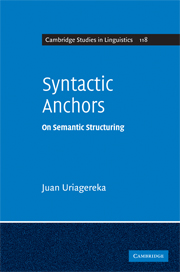Book contents
- Frontmatter
- Contents
- List of tables
- List of figures
- List of acronyms
- Introduction
- Acknowledgements
- 1 In defence of D-structure
- 2 So what's in a word?
- 3 Relational nouns, reference and grammatical relations
- 4 Online conditions and parametric variation
- 5 Prepositional case throughout
- 6 Iteration and related matters
- 7 (Re)Interpreting the Chomsky Hierarchy
- 8 Naturalizing meaning
- Epilogue: Evo-Devo-Perfo
- References
- Index
6 - Iteration and related matters
Published online by Cambridge University Press: 22 September 2009
- Frontmatter
- Contents
- List of tables
- List of figures
- List of acronyms
- Introduction
- Acknowledgements
- 1 In defence of D-structure
- 2 So what's in a word?
- 3 Relational nouns, reference and grammatical relations
- 4 Online conditions and parametric variation
- 5 Prepositional case throughout
- 6 Iteration and related matters
- 7 (Re)Interpreting the Chomsky Hierarchy
- 8 Naturalizing meaning
- Epilogue: Evo-Devo-Perfo
- References
- Index
Summary
Introduction
This chapter is devoted, to start with, to a problem posed by iterative expressions, common in colloquial speech, of the sort in I'm very very tired. In a nutshell, as the second part of the chapter argues, the problem is that expressions of this sort work very similarly in all languages (invoking emphasis, but also a few, arguably related notions); this is an a priori puzzle for any theory that assumes the essential arbitrariness of the syntax/semantics mapping. A solution to this puzzle is proposed in the third section of the chapter; it implies treating the relevant expressions in finite-state fashion, following ideas already sketched in early works by Chomsky. If as is emphasized throughout this book, all levels of the Chomsky Hierarchy presupposed by the human language faculty are relevant to semantic interpretation(s), then the simplest among those levels too should enter the equation. Up to this point, we have only worried about phrasal (context-free) and transformational (context-sensitive) relations; now it's time to explore even more basic dependencies. In the fourth part of the chapter it is argued that finite-state syntax is both more common than it may seem, and crucial to mechanics argued for here. Section 5 raises some conjectures and speculations about adjunctal elements in general, and the chapter ends with a section summarizing the main conclusions for the project in the book.
The realm of iteration
We may organize the empirical discussion by sorting out the essential iterative data base.
- Type
- Chapter
- Information
- Syntactic AnchorsOn Semantic Structuring, pp. 187 - 224Publisher: Cambridge University PressPrint publication year: 2008

